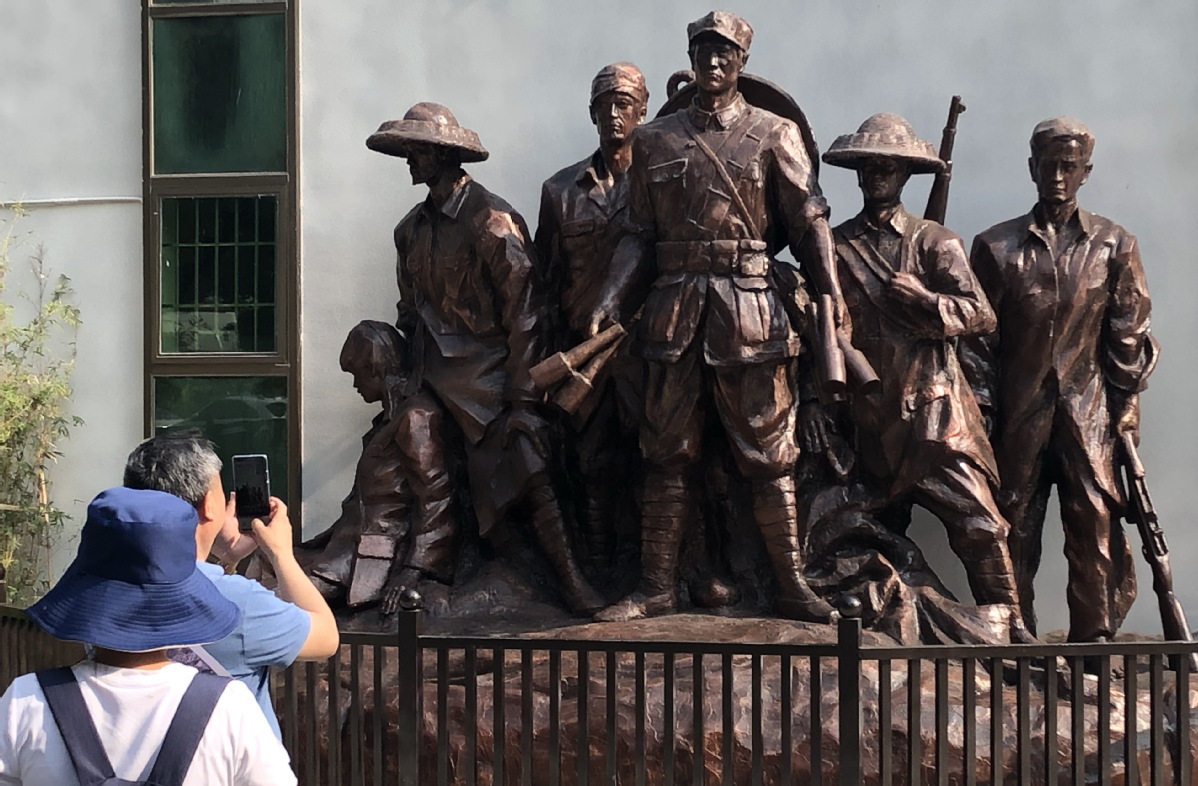Red tourism sparkling in Guangdong

An elderly couple take photos in front of a sculpture of revolutionary martyrs in Lixi village, Zhongshan, Guangdong province. [Photo by Zheng Caixiong/China Daily]
Zhongshan, a city in Guangdong province that is rich in Communist Party of China heritage, is promoting Red tourism to coincide with this year's Party centenary.
Towns and villages in the Pearl River Delta city, the hometown of late republican leader Sun Yat-sen, have been urged to renovate, rebuild and protect their valuable Red history and cultural sites and improve the environment to boost the Red tourism industry, its publicity authorities said.
Zhang Daoyou, a staff member at the Former Residence of Yang Yin, who was among the early leaders of the CPC, said the Nanlang town government had rebuilt and renovated it and is now working on the former residences of other revolutionary martyrs in Cuiheng village.
"The number of visitors to Yang's former home has been on the rise since the beginning of the year," Zhang said, adding that the other residences will be open to the public before July 1, when the CPC will celebrate the 100th anniversary of its founding.
Yang's former home in Cuiheng was listed as a key historical and cultural site in Guangdong in June 1989.It has become a major tourist attraction and a base of Red education since it opened to the public in 2002.
Zhang said it has been visited by more than 500,000 tourists, including 300,000 Party members.
Yang (1892-1929), who joined the CPC in 1922, was a famous leader of the workers' movement and one of the important leaders in the early days of the CPC. He took part in a monthslong strike in Guangzhou and Hong Kong in 1925 and the Guangzhou Uprising in 1927, Zhang said.
Cui Jingwei, Yang's granddaughter, said she hoped locals and visitors, particularly the young, will remember the revolutionary martyrs and be encouraged to study and work harder to contribute to the construction of the country after visiting the Red sites.
In Zuobu village, Party secretary Lin Qingbiao said it will boost investment in protecting and renovating its Red history and cultural sites to promote Red tourism and further improve the rural environment.
He said more homestays and tourist facilities will be built to meet growing Red tourism demand in the months ahead.
Zuobu was the hometown of Ou Chu, one of the leaders of the Zhujiang Column, a guerrilla force which fought Japanese forces in South China during the War of Resistance Against Japanese Aggression (1931-45).
Luo Jiahao, who graduated from South China Agricultural University last year, said more young university graduates are returning to the village to start businesses now that its environment has been greatly improved and it has become a popular scenic spot.
Luo runs a coffee shop in Zuobu that is enjoying brisk business, particularly during holidays and on weekends.
Feng Xiufeng, Party secretary of Nanqiao village, said it will protect and renovate the former site of the Zhujiang Column Headquarters and improve its infrastructure to promote Red tourism.
Nanqiao's Red history and cultural sites will play an important role in boosting tourism and the local economy, she said.
Lin Guochang, Party secretary of Lixi village, said it will erect several new sculptures of its revolutionary martyrs to cherish their memory and help boost Red tourism.
Six soldiers from Lixi died fighting Japanese invaders during the War of Resistance Against Japanese Aggression, he said.



 Print
Print Mail
Mail